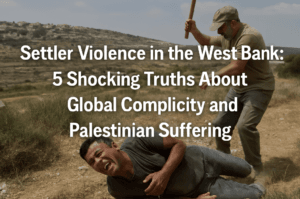Settler Violence in the West Bank: 5 Shocking Truths About Global Complicity and Palestinian Suffering
In April 2025, 16-year-old Ahmad Odeh became a symbol of the escalating settler violence plaguing the occupied West Bank when an Israeli settler deliberately struck him with a car in Huwwara, leaving him with life-threatening injuries. His case, documented by Defense for Children International – Palestine, underscores a systemic crisis: state-backed impunity for settlers who terrorize Palestinian communities to force displacement.
Attacks like these—often ignored or enabled by Israeli forces—are part of a decades-long strategy to expand illegal settlements, violating international law and amounting to de facto annexation. Over 700,000 settlers now occupy stolen Palestinian land, supported by global corporations like Caterpillar and Airbnb, which profit from infrastructure and tourism in settlements. A 2024 International Court of Justice ruling condemned Israel’s settlement enterprise as illegal, yet nations like the U.S. continue funding military aid that sustains it.
Palestinian children, facing trauma and harassment, bear the brunt of this violence, while global inaction perpetuates their suffering. Accountability demands halting arms sales, banning settlement goods, and pressuring complicit entities—steps critical to ending cycles of occupation and violence.

Settler Violence in the West Bank: 5 Shocking Truths About Global Complicity and Palestinian Suffering
On a quiet afternoon in April 2025, 16-year-old Ahmad Wisam Ahmad Odeh became another casualty in a decades-long struggle. While walking with friends in Huwwara, a Palestinian village south of Nablus, a white car with Israeli license plates swerved toward the group. The driver accelerated, striking Ahmad head-on. The impact threw him 33 feet down the road, leaving him with a lacerated liver, a head wound requiring 20 stitches, and full-body bruising. His story, documented by Defense for Children International – Palestine (DCIP), is not an isolated incident but a snapshot of escalating settler violence and systemic impunity in the occupied West Bank.
The Attack and Its Aftermath
Ahmad’s ordeal did not end with the collision. After being rushed to a local clinic, Israeli forces raided the medical facility, interrogating staff about his whereabouts. Such intrusions underscore a pattern of harassment that extends beyond physical attacks, targeting even healthcare access for Palestinians. Ahmad’s injuries—life-altering yet survivable—mirror countless others: in 2024 alone, DCIP reported over 120 settler attacks on Palestinian minors, a 40% increase from the previous year. These acts often occur in full view of Israeli security forces, who rarely intervene to protect Palestinian civilians.
Settler Violence: A Tool of Displacement
Settler aggression is not random but a strategic component of Israel’s expansionist policies. Since 1967, over 700,000 settlers have moved into the West Bank, facilitated by state-backed infrastructure and legal favoritism. Violent tactics—arson of olive groves, home invasions, and vehicular assaults—are employed to terrorize Palestinians into abandoning their land. Huwwara, where Ahmad was attacked, has been dubbed a “hotspot” for such violence; in 2023, a settler mob burned dozens of homes and cars there, chanting, “Burn the village!”
International law unequivocally condemns settlements as illegal, yet Israel’s government continues to legitimize them. Ayed Abu Eqtaish of DCIP notes, “Settlers act with near-total impunity, shielded by authorities who view their presence as a political asset.” Less than 3% of settler attacks result in indictments, per Israeli human rights group Yesh Din.
The Global Economy Fueling Occupation
The sustainability of settlements relies on more than local actors. A 2024 UN report identified 112 multinational corporations—including Airbnb, JCB, and Caterpillar—as complicit in normalizing Israel’s occupation. Caterpillar bulldozers, for instance, routinely demolish Palestinian homes, while settlement-run businesses profit from stolen resources like water and agricultural land. These entities operate within a legal gray area, exploiting gaps in international trade laws to market settlement goods (often labeled “Made in Israel”) worldwide.
The ICJ’s Landmark Ruling and Global Inaction
In 2024, the International Court of Justice (ICJ) declared Israel’s settlement enterprise a violation of the Fourth Geneva Convention, affirming it as a form of de facto annexation. The ruling obliges nations to cease all support for settlements, yet enforcement remains lax. While the EU mandates labeling settlement products, the U.S. continues to provide $3.8 billion in annual military aid to Israel, indirectly subsidizing infrastructure that benefits settlers.
The Human Cost: A Generation Traumatized
For Palestinian children like Ahmad, violence is a daily specter. Schools near settlements often operate under military guard, and students face harassment at checkpoints. Psychologists report soaring rates of anxiety and PTSD among youth. “Every attack sends a message: ‘You don’t belong here,’” says Rana Nashashibi, a Ramallah-based counselor. “This isn’t just physical harm—it’s erasure.”
Pathways to Accountability
Grassroots movements, such as the Boycott, Divestment, and Sanctions (BDS) campaign, urge pressure on complicit corporations and governments. Legal advocates are pushing for ICC investigations into settler violence as potential crimes against humanity. Meanwhile, DCIP and others demand that third countries:
- Halt arms sales to Israel.
- Ban settlement goods entirely, beyond mere labeling.
- Impose travel bans on violent settlers.
Ahmad’s story is a microcosm of a broader injustice—one enabled by global apathy. As settlements expand, so does the urgency for decisive international action. Without it, the cycle of violence and displacement will only deepen, leaving another generation of Palestinian children to pay the price.
—Human rights analysts emphasize that accountability begins with recognizing the interconnectedness of economic interests, political silence, and civilian suffering. The world’s response to Ahmad’s trauma will test its commitment to justice beyond rhetoric.
You must be logged in to post a comment.